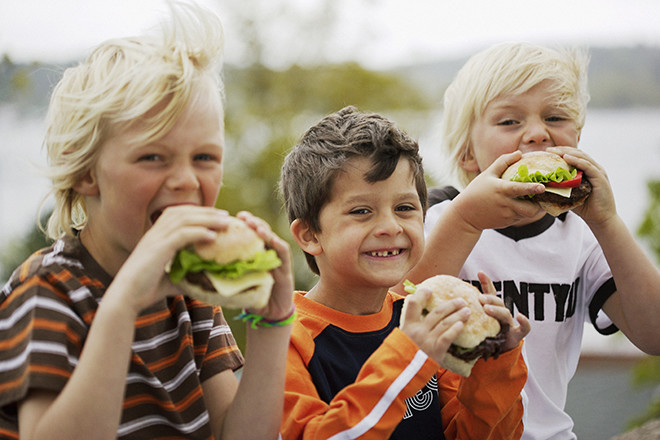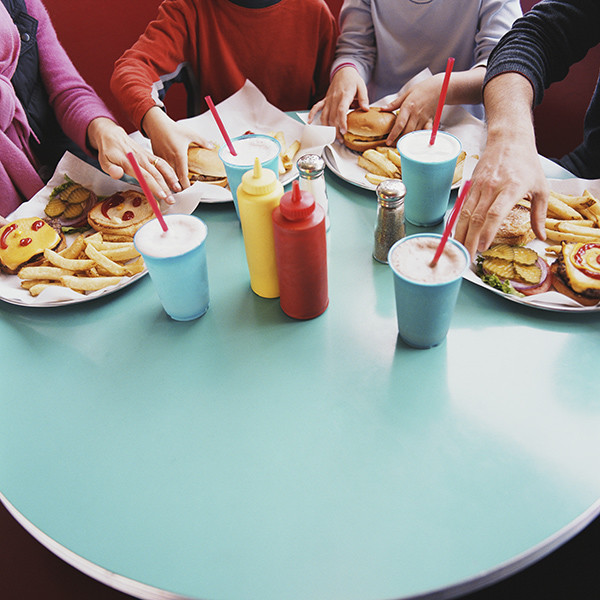To understand the topic helps us Eugene IvanovichSas - gastroenterologist, hepatologist, doctor of medical sciences, professor, leading researcher of the research center of the St. Petersburg State Pediatric Medical University. A photo: Getty Images First, fast food is dangerous for children and teenagers in that it forms the wrong eating behavior and eating habits. Children who did not eat fast food (imagine there are such), prefer other food (in the case of giving a choice) and do not feel all of its taste "charms." Thus, the foundations of a healthy diet are preserved for them for life. And, on the contrary, children, accustomed to fast food, regard its restriction in food as a kind of restriction of freedom, trying to consume it is already hidden. Secondly, fast food contains a large number of calories. For example, 100 grams of chips can be compared with 220-250 grams of boiled veal, 380-400 grams of turkey and 500-580 grams of cod. However, if the chips are "not food", then all the rest (along with the vegetables) is a very significant lunch or dinner. Thirdly, fast food contains a lot of fats and carbohydrates. Not going into polemics about the dangers of trans fats (which is really the case, and long-term results will be visible to scientists only in the near future), we are obliged to say about the negative effect of fats on the intestinal microflora. Thus, nutrition of laboratory animals with food with excessive fat content led to a significant growth of pathogenic microorganisms, increased intestinal permeability and a massive flow of toxins into the blood (studies in humans were not carried out because of their inhumanity, but volunteers - fast food fans - showed exactly the same results) . Fourth, the increase in calorie intake and changes in the intestinal microflora lead to a disruption in the metabolism of the child (increased cholesterol, impaired glucose tolerance, diabetes, oz irrigating). In the early stages, the digestive system begins to suffer. This is manifested primarily by dysbiosis (dysbiosis) of the intestine and dyskinesia of bile ducts.
A photo: Getty Images First, fast food is dangerous for children and teenagers in that it forms the wrong eating behavior and eating habits. Children who did not eat fast food (imagine there are such), prefer other food (in the case of giving a choice) and do not feel all of its taste "charms." Thus, the foundations of a healthy diet are preserved for them for life. And, on the contrary, children, accustomed to fast food, regard its restriction in food as a kind of restriction of freedom, trying to consume it is already hidden. Secondly, fast food contains a large number of calories. For example, 100 grams of chips can be compared with 220-250 grams of boiled veal, 380-400 grams of turkey and 500-580 grams of cod. However, if the chips are "not food", then all the rest (along with the vegetables) is a very significant lunch or dinner. Thirdly, fast food contains a lot of fats and carbohydrates. Not going into polemics about the dangers of trans fats (which is really the case, and long-term results will be visible to scientists only in the near future), we are obliged to say about the negative effect of fats on the intestinal microflora. Thus, nutrition of laboratory animals with food with excessive fat content led to a significant growth of pathogenic microorganisms, increased intestinal permeability and a massive flow of toxins into the blood (studies in humans were not carried out because of their inhumanity, but volunteers - fast food fans - showed exactly the same results) . Fourth, the increase in calorie intake and changes in the intestinal microflora lead to a disruption in the metabolism of the child (increased cholesterol, impaired glucose tolerance, diabetes, oz irrigating). In the early stages, the digestive system begins to suffer. This is manifested primarily by dysbiosis (dysbiosis) of the intestine and dyskinesia of bile ducts. Photo:Getty ImagesPeriodically appearing heaviness after eating, diffuse abdominal pain, bloating and flatulence, belching and bad breath (halitosis), a tendency to either constipation or loose stools (frequent or mushy stools) - this is an incomplete list of symptoms of these diseases. Both diagnoses are quite common among schoolchildren. Naturally, in addition to a healthy lifestyle, you will need a specialist consultation and adequate but safe drug therapy. The doctor will first recommend increasing the consumption of dietary fiber (porridge, vegetables, etc.). However, for therapeutic purposes, it is extremely difficult to cope with just nutrition, so medications are often prescribed. For example, Eubicor or Eubicor crumbs (or Fitomucil, Mukofalk). In addition, it is necessary to restore the optimal composition of bile in order to normalize the motility of the biliary tract. For this, Ursosan is often prescribed, which is also a hepatoprotector. After 3-4 months of using this drug, the thickening of bile, which often contributes to the formation of gallstones, is eliminated. There are a number of other drugs in this group, for example, Ursor or Ursodez. The most common question that parents ask is: how often can a child be allowed to eat fast food? The answer is simple. The treatment of obesity, which very often occurs in fast food lovers, is compared in complexity to the treatment of drug addiction, so the question can be rephrased as follows: how often can drugs be used? Eat right and be healthy! Also interesting:
Photo:Getty ImagesPeriodically appearing heaviness after eating, diffuse abdominal pain, bloating and flatulence, belching and bad breath (halitosis), a tendency to either constipation or loose stools (frequent or mushy stools) - this is an incomplete list of symptoms of these diseases. Both diagnoses are quite common among schoolchildren. Naturally, in addition to a healthy lifestyle, you will need a specialist consultation and adequate but safe drug therapy. The doctor will first recommend increasing the consumption of dietary fiber (porridge, vegetables, etc.). However, for therapeutic purposes, it is extremely difficult to cope with just nutrition, so medications are often prescribed. For example, Eubicor or Eubicor crumbs (or Fitomucil, Mukofalk). In addition, it is necessary to restore the optimal composition of bile in order to normalize the motility of the biliary tract. For this, Ursosan is often prescribed, which is also a hepatoprotector. After 3-4 months of using this drug, the thickening of bile, which often contributes to the formation of gallstones, is eliminated. There are a number of other drugs in this group, for example, Ursor or Ursodez. The most common question that parents ask is: how often can a child be allowed to eat fast food? The answer is simple. The treatment of obesity, which very often occurs in fast food lovers, is compared in complexity to the treatment of drug addiction, so the question can be rephrased as follows: how often can drugs be used? Eat right and be healthy! Also interesting:

Making Money with Desserts: Success Stories
Evgeniya Polischuk (Fedutinova) instagram:@evgeniyafedutinovavk.com/janeshomebaking– It all started with baking for family and friends. Gradually, I started posting photos of my baked goods on Instagram – and orders started coming in. I made my first custom-made cake on October 13, 2014, and a little earlier I started making macaroons and cupcakes. You could say that the business “found me”, I am very […]

Soups are cold recipes with photos
Cold cucumber soup with yogurt and lemonsorbet from the chef of the restaurant La Taverna Alexander Zhurkin Photo: Getty Images Ingredients: Plain yoghurt – 125 g Cucumber – 150 g Lemon/lime sorbet – 50 g Cocktail shrimp – 24 g Fresh ginger juice – 1 g Lime juice – 5 g Fresh orange juice – 5 g Parsley – 1 g Pink pepper – 1 g Watercress – […]

barbeque kebab
Pork tenderloin in glaze Photo:Dmitry Bayrak/dbstudioPreparation time: 20 minutes + marinating time.Calories: 454 kcal per serving.For 4 servings: 4 pork tenderloins (approximately 300 g each), 1 onion, 2 cloves of garlic, 1 tsp. lemon zest, 1 tsp. lemon juice, a pinch of ground cumin, coriander and turmeric, 1 tbsp. vegetable […]

Pierre Duacan: dietary recipes: Ducane diet
Beetroot soup Photo:Season’S, Luxury Hotels RepresentationYou will need:· Boiled beetroot – 60 g· Fresh cucumbers – 20 g· Red radish – 20 g· Green onions – 10 g· Egg – 1 pc.· Drinking mineral water – 200 g· Salt – 1 gPreparation:· Boil the egg and beetroot.· Grate the cucumbers, radish and part of the beetroot. Put everything […]



